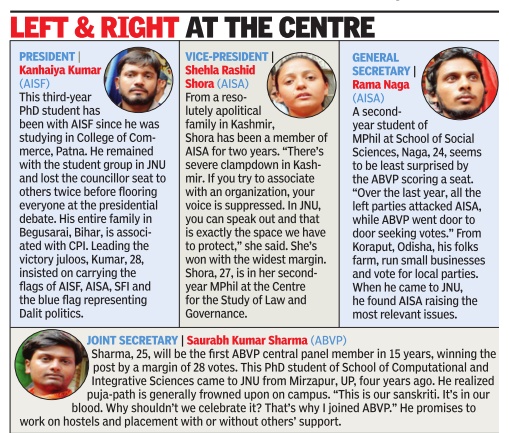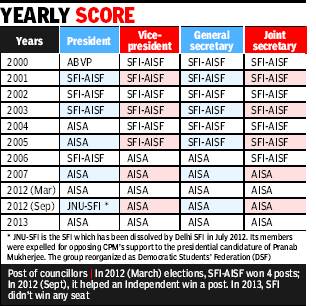Jawaharlal Nehru University Students’ Union (JNUSU)
This is a collection of articles archived for the excellence of their content. |
Contents |
JNU Students’ Union elections
2000-13
JNU still a red bastion, but SFI no more the leader
Manash Pratim Gohain TNN
The Times of India 2013/09/17
New Delhi: Jawaharlal Nehru University remains a red bastion. But the organization that dominated students’ politics there for nearly 25 years received its worst drubbing in 2013. Students’ Federation of India, CPM’s student wing, failed to win even a councillor post in JNU Students’ Union polls. In the contest for the four central panel posts, SFI fell below NSUI and ABVP in three. The decline of SFI has been attributed to deterioration of left politics in general and CPM’s weakening in particular.
in 2013, SFI’s presidential candidate came an embarrassing fifth; the group has won the president’s post just once since 2004, and no central panel post since 2007. The expulsion of some of its senior-most members in July 2012 — they’d first formed SFI-JNU and later Democratic Students’ Federation — for opposing CPM’s support of Pranab Mukherjee’s candidature for the post of President may have driven the final nail into the coffin.
Political scientist Yogendra Yadav says, “Established Left has lost its moral and ideological charm. This was compounded by the split. When SFI started looking like a wing of the political establishment, AISA emerged as a formation that represented radicalism. The youth is naturally attracted to radical movement. There is an emerging space in national politics for alternative politics. In JNU, at least for now, AISA appears to have captured that space.”
Emergence of SFI in JNU dates back to just before the emergency, the same period which produced prominent leaders such as Sitaram Yechury and Prakash Karat. But even then, among the Left organizations, CPM was considered “elite”. As JNU’s roll strength grew, students from semi-urban and rural background also multiplied. This, some Left analysts claim, resulted in the emergence of a “genuine Left” like Progressive Students’ Organization, which many say was a precursor to AISA.
The president of PSO in JNU in 1980-1981, a senior journalist now, Urmilesh says, “JNU has been a campus of some of the best minds and has a tradition of secular democratic ideology. The students are idealists and therefore the influence of Left has been immense. The fall of SFI is not an isolated incident; it’s connected to the decline of CPM’s political attractiveness. AISA has been raising issues like Nandigram. Leftleaning students who couldn’t shift to NSUI or ABVP, got an alternative in AISA.”
Former president of JNUSU (1985-86) and a senior journalist T K Arun says, “It has to do with the overall deterioration of Left politics. Though JNU remains a Left stronghold, the mainstream Left is not identified with raising issues such as poverty.” AISA has been present on campus since 1992; they contested JNUSU elections first in 1993, winning three central panel seats including president.
Questions are being raised on CPM’s treatment of its best student leaders. In fact, according to former JNUSU president (2001) Albeena Shakil, “Except one former president, nobody is with CPM. One lot joined the Congres. From 2000 onwards, all the anti-Congres JNUSU presidents from SFI have been expelled.” She argues that CPM is “close” to Congres and that puts off majority of the voters.
2015
AISA wins, ABVP second
The Times of India, Sep 14 2015

ABVP wins seat in JNU after 14 yrs In a comeback after 14 years, ABVP secured a JNU central panel seat in the students' union when Saurabh Kumar Sharma, who won by just 28 votes, took oath as the new joint secretary on Sunday , reports Shreya Roy Chowdhury . In 2014, ABVP candidates came second for the posts of VP and general secretary but, in both cases, the gaps were appreciably wide.
In 2015, ABVP second runners are practically snapping at the heels of the firsts with just 234 and 213 votes between them and the winners from AISA. ABVP last made a dent in the Left stronghold when Sandeep Mahapatra, who became president in December 2000.
2016
The issues
The Times of India, Sep 09 2016
`Jai Bhim' the war cry this JNUSU polls
If the number of “Jai Bhims“ presidential debate at Jawaharlal Nehru University is taken into account, Babasaheb Bhimrao Ambedkar seems big in the students' union polls. It seems each candidate wants to stake a claim to the movement following Rohith Vemula's suicide and anti-Dalit violence across the country.
The Left Unity's presidential candidate, All India Students' Association's Mohit Kumar Pandey , is being considered by his students' body a shoo-in for president, although he's more popular in Delhi University . Their confidence is inspired by the fact that all Left-leaning students would vote for him as there are no other candidates from the Red bastion in the fray .
Pandey spoke about the “Stand with JNU“ movement that took place after the February 9 Afzal Guru event, BJP MLA Gyandev Ahuja's condom-counting arguing that JNU “divides“ people. Even Prime Minister Narendra Modi was not spared. “He's moved from being Pradhan Sevak to Pradhan model,“ he said, referring to the advertisement campaign of a telecom firm.
He also reminded students about the “Occupy UGC“ protests against the scrapping of non-NET fellowships and the struggle against DU's four-year undergraduate programme. However, the Left Unity -an alliance of AISA and Students' Federation of India (SFI) -came in for criticism, as did Pandey for training his guns on Birsa-AmbedkarPhule Students' Association (BAPSA) before Akhil Bharatiya Vidyarthi Parishad (ABVP). National Students Union of India's (NSUI) Sunny Dhiman and ABVP's Janhawi Ojha were also seen chanting Jai Bhim along with the rest. The other candidates included Sonpimple Rahul Punaram of BAPSA and Deelip Kumar from Students Front for Swaraj, who is in the race for the first time.
BAPSA looked significantly more confident this year with more supporters, drums and cheering. They are propelled by the anger generated by Vemula's suicide, violence against Dalits and crackdown on Ambedkarite groups. Calling himself Kabali, Sonpimple declared, “This wave is of an Ambedkarite movement.“
He accused AISA for “defending a rapist“ and taunted SFI with the Supreme Court verdict on Singur and killing of Tapasi Malik. He promised to work on reducing dropout rates at JNU and in troduce minority deprivation points. He shone better while answering questions, encouraging ABVP's Ojha “to read Ambedkar“ and stated that he won't “go begging to the VC“ for anything but “topple him“ instead.
Ojha, the only woman in the line-up, said that she represents a party that “has won student elections from Kashmir to Kanyakumari.“ “We are the voice of people troubled by Naxalites and Leftists in Jharkhand and West Bengal. ABVP has fought for Indian languages in UPSC exams, for higher education and against floods in Bihar,“ she said.
Calling herself Babbar Sherni, Ojha told the Left, “You are not JNU.“ She bashed AISA over the rape case saying, “When rapes happen outside the campus, it's Nirbhaya. When it's on campus, it's kuchh nahin hua.“
NSUI's Dhiman said that the Left groups “hid in their rooms“ after the last JNUSU president was picked up by the police following the February 9 incident. “The radical people are responsible for the rise of ABVP on campus,“ he said. He also spoke at length about meeting Vemula's mother and asked if “Bharat Mata gave birth to people who beat Dalits and Muslims.“
Members of All India Student's Federation (AISF) and Democratic Student's Federation (DSF), though present in the crowd, came without their trademark daflis and were some of the quietest participants. AISF isn't contesting the polls and DSF has a candidate only for the post of joint secretary .
ABVP member, others can vote
A BVP's Saurabh Kumar Sharma has been allowed by the JNU election committee to vote on Friday. Earlier, the JNUSU joint secretary was barred from voting for involvement in the February 9 incident. Some other students have also been allowed. TNN
BAPSA emerges as strong force
The Times of India, Sep 10, 2016
Till the candidates from Birsa Ambedkar Phule Students Association (BAPSA) filed their nominations, the Left groups had no inkling they'd present the main challenge. The strong position of the new group's presidential candidate, Sonpimple Rahul Punaram, on the Jawaharlal Nehru University campus election 2016-17 has surprised everyone.
In JNUSU election, 59.6% of an electorate of about 8,600 voted — a turnout significantly higher than last year's 53%.
Polling at the School of International Studies (SIS) was halted because a councillor candidate's name was missing from the ballots.
Even AISA members said they didn't see BAPSA coming. "During the movement against the government and after February 9 and Kanhaiya Kumar's arrest, Shehla Rashid Shora, former vice-president and Rama Naga, general secretary, took over and generated goodwill for AISA. But the Left wasn't able to engage BAPSA in debate. There was no ideological dialogue till they filed nominations," said AISA's Sucheta De.
"Some are tired of the existing Left structures. Punaram, son of a rickshawpuller, has washed dishes in a canteen and he's the sort of leader common students want," said a member of another Left group. His speech at the presidential debate and pugilistic tone, helped.
"Now BAPSA's commitment to Ambedkarite politics will be tested," added De. Various members from the Left including Umar Khalid, have questioned BAPSA's politics and countered their claim of joining the movement after the Afzal Guru event. The Left maintains they even stayed away from protests against the High Level Enquiry Committee investigating it.
There are rumours that right-wing Akhil Bharatiya Vidyarthi Parishad (ABVP) is propping BAPSA up. "We aren't against just ABVP's politics but want to toss even their culture out. The oppressed unity is supporting us," said Punaram. But ABVP is clearly pleased to see BAPSA do well as the spreading votes drastically improve their chances of scoring a seat — exactly what Left Unity was created to avoid. BAPSA's Habeel MM said the organisation — a little over a year old — has the support of non-contesting ones such as Students Islamic Organisation, Youth Forum for Discussion and Welfare Activities and Jharkhand Tribal Students' Association. "BAPSA is visible this year. The situation outside — the Rohith Vemula issue, the lynching at Una — has brought attention to us too," said Habeel.
